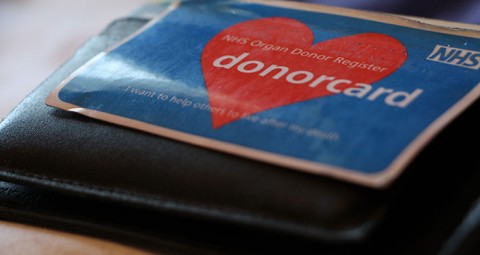BY Ryan McDougall | June 28 | ![]() 0 COMMENTS
0 COMMENTS ![]() print
print

MSPs lay out objections to state organ donation plan
‘An individual’s life, soul and body do not belong to the state,’ an MSP has said after plans to switch to an ‘opt-out’ system of organ donations were passed in parliament with just three objections.
Gordon Lindhurst, Conservative MSP for Lothian, Oliver Mundell, Conservative MSP for Dumfriesshire, and Christine Grahame, SNP MSP for Midlothian South, Tweeddale and Lauderdale, were the only members of Scottish Parliament to vote against the new system. Two other MSPs abstained.
Previously, it was necessary to ‘opt in’ to registering to become an organ donor, but the ‘opt-out’ system, voted in favour of by 116 MSPs, means people will have to state they do not want their organs used for transplants after they die.
The Church supports organ donation so long as it is the decision of the individual, but objected to the proposals, and has now said they risk ‘undermining trust in the healthcare system.’
Following the vote, three MSPs have given their reasons as to why they chose not to support the change to The Human Tissue (Authorisation) (Scotland) Bill.
Mr Lindhurst said: “In my view an individual’s life, soul and body do not belong to the state.
“It is wrong to legislate on a moral basis which contradicts this and my view is that a presumed consent system does so.
“It is in any event contrary to developing public policy in other areas which is against any presumption of consent by individuals, such as in relation to GDPR.
“While I agree with organ donation itself and understand why there is a desire to encourage it, I am not persuaded that the act passed will have the result intended.”
Mr Mundell said he does ‘not believe the state has the moral authority or right to create this kind of presumption in law’ and that the ‘opt out narrative undermines and erodes the long-standing position that organ donation is voluntary.’
He added: “As a registered organ donor myself, I believe that decisions around what happens to my body after I die are important but they are a personal matter for me and my family, not the state.
“By changing the conversation we are causing confusion and have in my view passed poor quality legislation.”
Mrs Grahame said she objected to a ‘presumption of consent’ surrounding the new opt-out bill.
Following the vote, Anthony Horan, director of the Scottish Catholic Parliamentary Office said: “Organ donation after death is to be encouraged as an expression of true altruism.”
“An opt-out system, however, risks the possibility that individuals will have their organs removed following their death, even if it was never their intention to donate.
“The bodies of people who have died are not commodities to be taken and used as spare parts.”
“Evidence from around the world has shown that opt-out organ donation is not necessarily required to increase donors and instead efforts are best focused on public education campaigns and investment in donor coordinators in hospitals.”
“This latest move serves to undermine trust in the healthcare system and threatens to undo the good work being done to encourage fully informed, consent-based donation.”










